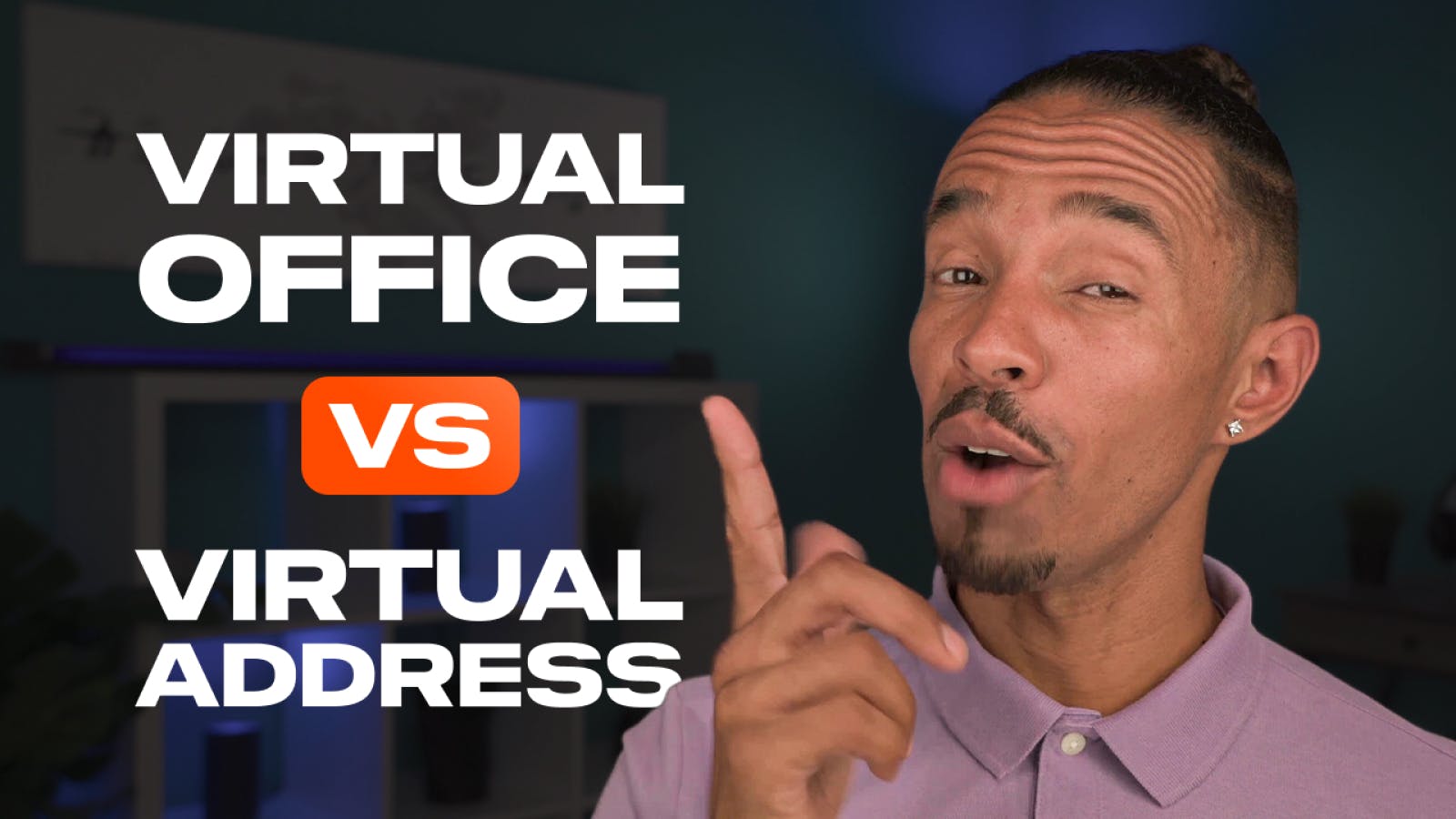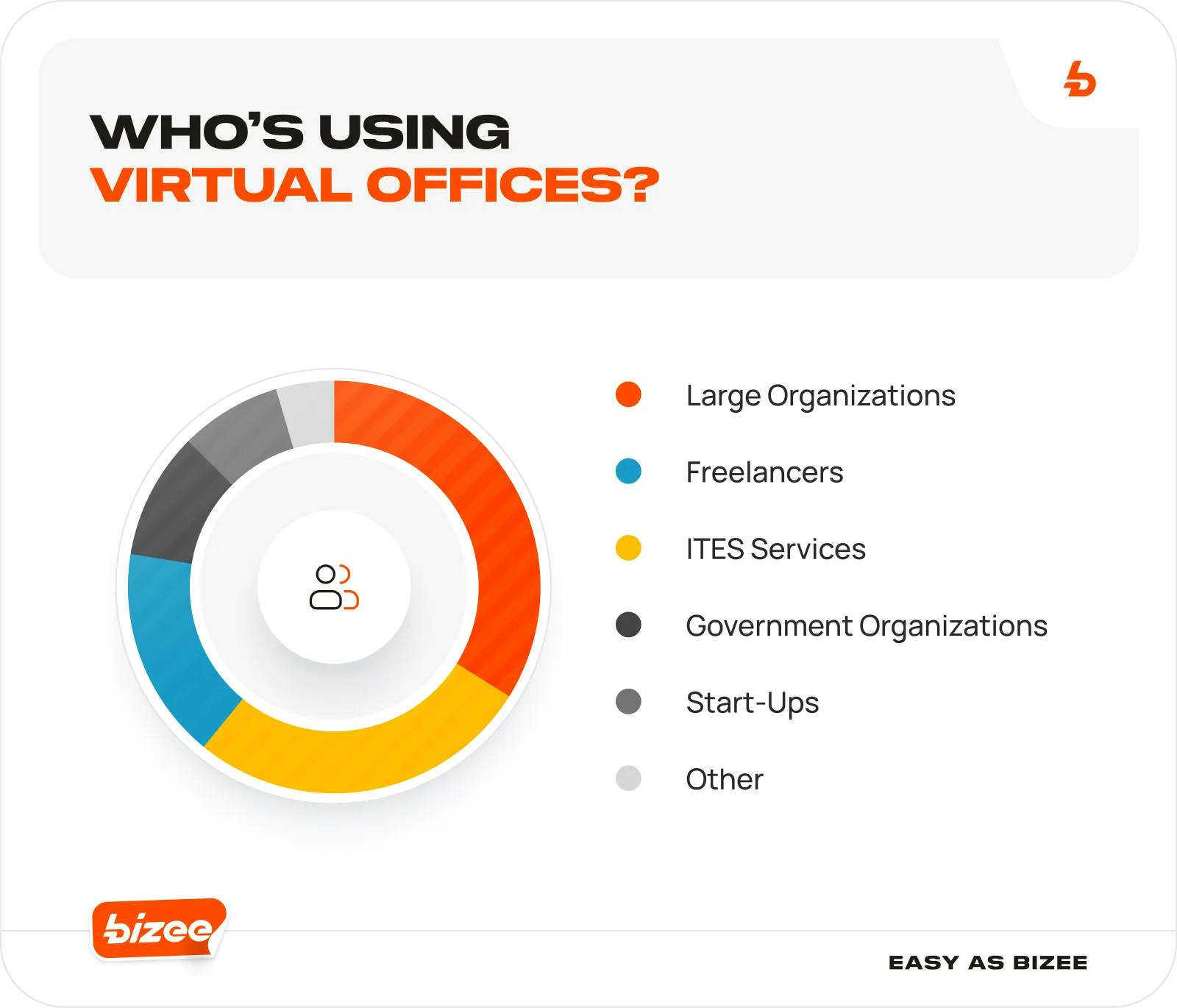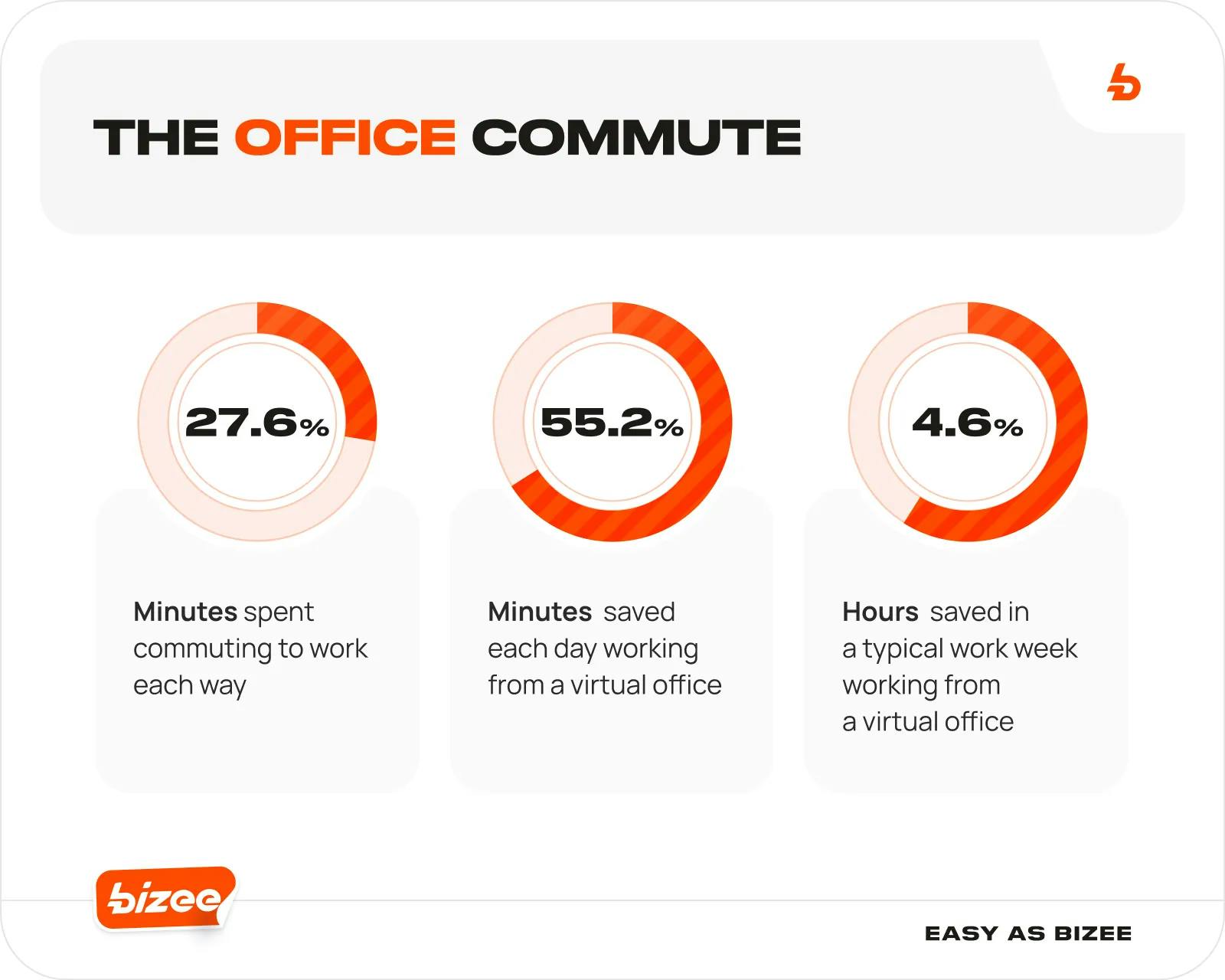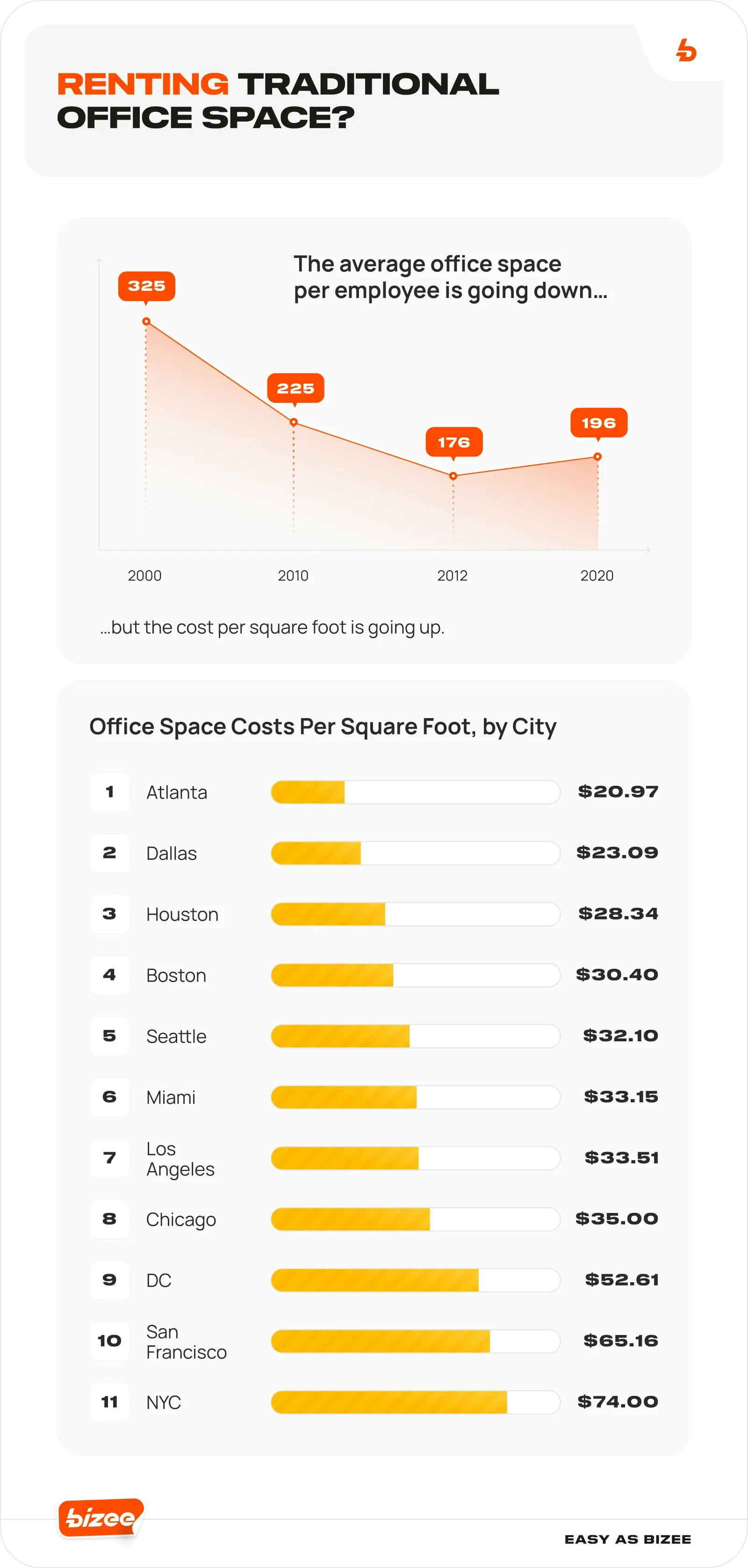Please note: This post contains affiliate links and we may receive a commission if you make a purchase using these links.
TABLE OF CONTENTS

The concept of the virtual office has been around for some time, but chances are you didn't hear much about them pre-2020. The global pandemic certainly thrust the "workspace of the future" into the spotlight, but the evolution from in-person to virtual office has actually been in the works for years.
Now, as a business owner and your own boss, you have the flexibility and autonomy to choose how and where you work...and you might find that a virtual office is the right choice for your business.
Let's take a closer look at what makes a virtual office, why business owners are gravitating to them more than ever before, and how you can create your own.
What Is a Virtual Office?
As our concept of the traditional workspace continues to evolve, the definition of a virtual office can be hard to pin down. Generally, though, there are two "types" of virtual offices:
Software-based: This type of virtual office is created when you assemble a custom suite of software, apps and programs needed to conduct your work remotely. This is the most common approach for small business owners who have employees, as the software suite keeps them connected and collaborating without the need for a communal office space.
Location-based: This type of virtual office is used mainly by individual business owners (often consultants or freelancers) who have no employees. With this type of virtual office, you choose where you do your work, whether it's a co-working space, a hot desk or a short-term leased office. If you do have employees, you may also choose to rent conference room facilities for occasional in-person meetups.

Note the disparity between virtual office users —– the two largest categories are major companies or individuals. However, as we enter a new era of remote-first work, it's likely we'll see small and mid-sized businesses jumping on the virtual office bandwagon.
What Is NOT a Virtual Office?
On the flip side, any place from which you work remotely isn't necessarily a virtual office. That includes:
Home: A home-based business isn't synonymous with a virtual office. That's primarily because home-based business is a pretty broad category. So, your virtual office might be located primarily in your home, but not every home-based business requires a virtual office.
Coffee shops: If your virtual office is the software-based type, you may very well take it on the road and work in places like cafes and libraries. But it's the software that makes the virtual office, not the place from which you use it. If you're going the second route, a location-based virtual office, you'll likely want to use places that are easily accessible and more conducive to work, like a co-working facility.
Virtual Address: A virtual address is often a necessity for businesses that have no physical location but they aren't, in and of themselves, virtual offices. Still, a virtual address can be a critical step in launching your virtual office, as we'll discuss in detail further on.
Protect Your Privacy and Check Mail From Anywhere in the World.
Get Started with Bizee’s Virtual Address Service.
Sign Up NowA Registered Agent Service: Getting a virtual office is an additional level of support for your business compared to a Registered Agent service. With a Registered Agent, you can designate a third party to serve as an agent to receive official correspondence or service of legal process sent to your business. Registered Agent services will also include automatic mail forwarding of any correspondence of documentation.
Benefits of Using a Virtual Office
As we said, virtual offices are more conceptual than anything you can clearly define. But whichever approach you take to your own virtual office, the benefits are undeniable.
Shorter Commute Times
Work commutes have been increasing over the last two decades, and all that time spent on the road is time you could spend running your business and increasing your productivity.

Just remember if you go with the second virtual office approach and seek out co-working spaces, you may still have a commute. But you also have more flexibility to choose a space that's easy and accessible based on your needs.
Cost Savings
Renting office space isn't cheap. And if you have employees in a traditional office setting, you'd need to calculate how much space you'd need for each one. But most office workers have been getting the squeeze for years.

So, less space, more money...not an ideal choice. A virtual office gives you powerful tools that will keep your employees connected while allowing them to choose where they work most comfortably and most productively.
Increased Privacy
Let's say you do operate a business from your home. You probably don't want your home address associated with your business. With a virtual office, you can choose to secure a virtual address that will provide a street address in your state of formation, where you can easily receive mail without sacrificing your privacy.
How to Set Up Your Virtual Office
Ready to get started with a virtual office? Great! First, you need to decide which type of virtual office works best for your business: software-based or location-based. From there, you can begin to narrow down the details.
Get Software That Gives You a Virtual Office Presence
Almost every modern office relies on software to get everything done in a more efficient way. Entrepreneurs setting up a virtual office will want to focus on software that’s easy to access, helps them communicate better and lets them work from anywhere.
Here’s how to decide on the virtual office software you might need:
- Look for software that you can access from any device.
- Focus on apps that enhance how you communicate with clients, vendors, partners and others.
- Consider where you’ll be working from.
Helpful virtual office software includes Zoom or Microsoft Teams for meetings, Slack for instant communications, Trello or Todoist for tasks and Dropbox or Google Drive for sharing documents.
Look for Temporary Work Spaces for a Virtual Office
Working from home is a perfectly good option for many entrepreneurs. But, some other business owners might want to get out of the house. Whether you want time away from home to focus on your priorities, or just fancy a change of scene, here are some considerations:
- Look for somewhere close to home.
- Focus on the amenities, like private offices, high-speed Wi-Fi and quality coffee.
- Think about the atmosphere — do you work better in a busy environment, or do you need peace and quiet?
Rent a Virtual Office for a More Permanent Space
If you want to work outside the home more often, and need a more stable base of operations, then a leased office could be perfect. There’s a lot of flexibility here, with many companies offering short-, medium- and long-term accommodations for businesses.
Use a Virtual Address and Mail Scanning Service
Another option we've mentioned for the on-the-go entrepreneur is a virtual address service. This provides you with a real-world street address, together with secure scanning and electronic delivery of any business mail. Services provided by a virtual address include:
- One address for all correspondence: A real-world street address that you can give to suppliers, banks, customers, government agencies and more.
- Reduce mail at home: Getting a virtual address can help cut down on the amount of junk mail you receive at home. Redirect those business mailings to your virtual office, and you can save room in your home mailbox.
- Review mail, wherever you are: All paper mail is scanned and uploaded to a secure, private console where you can read and review correspondence at your convenience on any device.
- Professional image for your business: A business address is more prestigious than a residential address and could subtly enhance your reputation and marketing.
More privacy: Do you want to have a clearer separation between your personal life and your business? Keep your business mailings going to a virtual address and you can have a stronger boundary between your work and your home life.
Virtual Office FAQs
What is the difference between a home office and a virtual office?
A home office is very convenient for entrepreneurs, but there may be some downsides. Restricted space, family commitments or a lack of boundaries can all be a challenge. A virtual office isn't always a place but rather a concept or method of doing business. Virtual offices provide flexibility, so if working in your home isn't a good solution, you can take your office on the road and work from anywhere.
Can I use a virtual address for an EIN application?
The IRS asks for your business address when you apply for an EIN. If you've already used a virtual address service to get your address, you can use it when obtaining your EIN.
Can I use a virtual address for my Registered Agent?
No, you should use a proper Registered Agent service for your address to receive official documents.
Can I use a virtual address for other legal purposes?
Using a virtual address is a good option in some cases. See our guide, “Can I Use My Virtual Office Address as My Legal Business Address?” for more.
If you need a virtual address to get your virtual office going, Bizee can help. We have a complete address and mail scanning service so you can rely on getting important mail on time while working wherever it works for you.
Protect Your Privacy and Check Mail From Anywhere in the World.
Get Started with Bizee’s Virtual Address Service.
Sign Up Now
Wendi Williams
Wendi is a freelance writer based in Indianapolis, IN, with over a decade of experience writing for a variety of industries from healthcare to manufacturing to nonprofit. When she isn't working on solutions for her clients, she can be found spending time with her kids and husband, working in the garden or doing more writing (of the fiction variety).
like what you’re reading?
Get Fresh Monthly Tips to Start & Grow Your LLC










